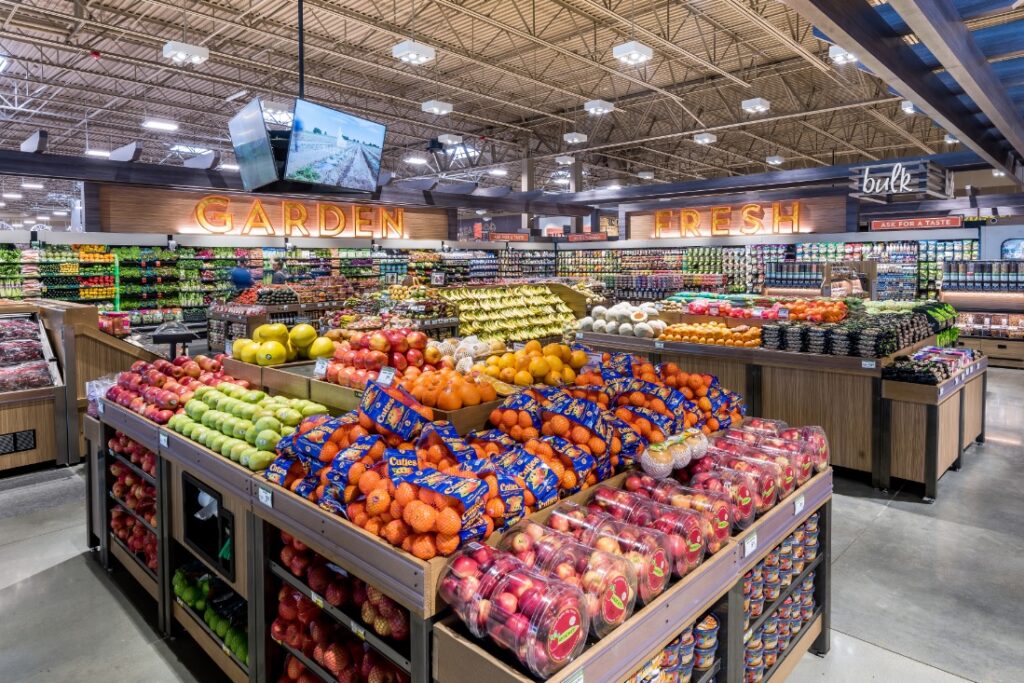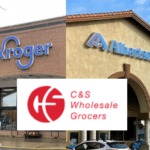
Kroger and Albertsons say they’re prepared to fight back against an effort to block their proposed merger. But their supporters appear to be few, as critics present a united front against a grocery combination they say will be bad for shoppers and employees, and good only for the companies’ executives and shareholders.
The Federal Trade Commission announced midday Monday that they would challenge Kroger’s planned $24.6 billion acquisition of Albertsons, which would combine the country’s largest and second-largest traditional grocery chains into a nationwide giant. The agency said the combination would “eliminate fierce competition,” leading to higher prices, lower quality and a subpar working environment for employees.
Late in the day, the agency’s arguments and the path forward became clearer, in paperwork filed with a federal court. The FTC plans to hold a hearing before an administrative law judge beginning on July 31, delaying Kroger and Albertsons’ preferred timeline for their merger by more than five months. In the meantime, the FTC is asking for a temporary restraining order and preliminary injunction, preventing the retailers from moving forward with their proposed transaction until that hearing can be held.
Several consumer groups and union representatives applauded the government challenge, as the court documents revealed further insights into the FTC’s rationale for opposing the deal.
In hundreds of communities across the country, “the proposed acquisition would create a single supermarket with market shares so high as to be presumptively unlawful under the antitrust laws,” the FTC argues. While Kroger and Albertsons have proposed to sell hundreds of stores where the two retailer closely compete, “the proposed divestiture does not solve the competitive issues created by the proposed acquisition,” as many local markets will see no divestitures at all, “leaving local market conditions unchanged.” The plan to sell stores, then, “does not justify allowing this illegal merger to proceed,” the FTC asserts.
Kroger and Albertsons claim a combined company would better be able to compete against larger national rivals, particularly Walmart. The FTC counters that, separately, the retailers already successfully withstand competition. They’re able to compete against the likes of Costco, for example, because Kroger and Albertsons stores are more conveniently located and they don’t charge membership fees. They’re not likely to lose much business to the likes of ALDI or Dollar General, because they offer a wider variety of products and customer service options. And they have an advantage over online retailers like Amazon, in that shoppers are able to pick out their own products in person at Kroger or Albertsons.
And yet the FTC never mentions the retailers’ ability to compete against Walmart, which is at the core of their argument behind why they need to combine. Even a combined Kroger-Albertsons would still remain a distant second to Walmart in terms of size and dominance of the national grocery market. Nevertheless, the FTC argues that Kroger and Albertsons “cannot demonstrate merger-specific, verifiable, and cognizable efficiencies sufficient to rebut the presumption of harm.”
So the FTC’s stance is more about its opposition to allowing two large companies to combine, than it is about allowing an even larger company to exist. If Kroger and Albertsons were to grow organically, like Walmart has, perhaps the federal regulators’ position would be different. But “Kroger’s present-day portfolio of stores and banners is the product of four decades of continuous consolidation,” the FTC points out, while “much like Kroger, Albertsons Companies today is the product of serial acquisitions” as well.
A number of consumer advocacy groups have spoken out in support of the FTC’s challenge. “Today, antitrust enforcers made it clear that grocers cannot merge their way to dominance,” the Open Markets Institute said in a statement. “We are thrilled to see the Federal Trade Commission stand up to dangerous grocery consolidation that would have harmed workers, farmers, and shoppers.” The government watchdog Accountable.US called the challenge “the right move for American families fed up with food industry price-gouging.” UFCW local unions representing more than 100,000 grocery employees said the FTC rightfully pointed out that “the megamerger would have resulted in lost jobs, closed stores, food deserts, and higher prices with reduced food choices.” And the American Economic Liberties Project said “Kroger and Albertsons would be wise to save everyone’s time and abandon this deal.”
The Institute for Local Self-Reliance, meanwhile, called on the FTC to go even further, “and end the predatory buying tactics of Walmart, Dollar General, and other big chains.” There is “no upside to this merger for anybody other than the top executives at these two companies and their investors,” co-executive director Stacy Mitchell said in a statement. She also applauded the FTC’s move “rejecting the companies’ offer to sell off stores as a way to supposedly ‘fix’ this blatantly anticompetitive merger.”
The retailers’ plan to sell more than 400 stores to C&S Wholesale Grocers came under withering criticism in the FTC’s challenge. “C&S — a wholesaler with limited supermarket operating experience — is a poor choice for a divestiture buyer and increases the likelihood that the divested stores will flounder or fail,” the FTC argues. “C&S has spent most of the last decade seeking to avoid being a supermarket operator,” it goes on, quoting C&S as saying about previous acquisitions that “we do not intend to grow our grocery retailing operations or to operate the retail grocery stores in the long term. We expect to divest our retail grocery stores as opportunities arise.”
“C&S, Kroger, and Albertsons now claim the opposite,” by portraying C&S as “a seasoned, well-positioned supermarket operator that plans to operate the divestiture supermarkets itself into the future,” the FTC points out. In addition, the stores to be divested are spread out all over the country, creating “a substantial risk of competitive diminution or outright failure.” There are no “full, intact business units in the proposed divestiture, and the assets included are insufficient to operate a supermarket business that substantially replaces Kroger or Albertsons.” As a result, “C&S will need to construct a brand-new supermarket business on the fly, including new banner names at over 80 percent of the locations, new private label products, new loyalty programs, and new e-commerce platforms.”
In short, Kroger and Albertsons have “selected a buyer in C&S that is poorly positioned to operate these stores successfully,” the FTC concludes. “The public — not Defendants — would bear the risk of this failure.”
Both retailers pushed back against the FTC’s arguments yesterday, claiming that a merger would create efficiencies that would result in lower prices and better quality. And one local union was nearly alone in expressing support for the deal. UFCW Local 555, which represents grocery workers in Oregon, Washington and Idaho, noted that “grocery is a business of constant change” and said “it’s foolish to think that stopping this merger means everything will stay the same.” The proposed merger, it went on, “combined with a significant divestiture to C&S, represents a good outcome” for union members, who “would rather work for people who run grocery stores over online or big box retailers.”
Now, it will be up to a federal judge to decide whether to stop this plan in its tracks until both sides can argue their case this summer – setting the stage for a long, contentious debate that won’t end any time soon.
Image source: Albertsons











Consumers have submitted 1,000s of complaints against this merger through the CO, NV, AZ, and WA attorneys general offices and in AK through their congressional representatives among others. Consumers, especially those from CO westward where Kroger and Albertsons are the main 2 competitors, do not want this merger, because they will have, among other things, less weekly sales to shop with prices lower than Walmart. YET Kroger and Albertsons still keep moving forward with this NOT listening to their own customers. This shows what it’ll be like if they get to merge: ‘We get to do what we want to do, and you’re stuck with us.’